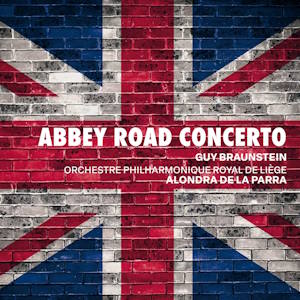
Guy Braunstein (b.1971)
Abbey Road Concerto (c 2020)
Ralph Vaughan Williams (1872-1958)
The Lark Ascending (1914 rev 1920)
Frederick Delius (1862-1934)
Violin Concerto (1916)
Guy Braunstein (violin)
Orchestre Philharmonique Royal de Liège/Alondra de la Parra
rec. 2021, Salle Philharmonique de Liège, Belgium
Alpha Classics 869 [72]
The violinist Guy Braunstein has written an Abbey Road concerto, casting it in fifteen movements linked by Intermezzi, that pays tribute to his household’s Beatlemania. I remember reviewing Tolga Kashif’s Queen Symphony many years ago – a work that continues to receive airplay – and as I happen to enjoy this kind of thing, I was interested to see how Braunstein would go about the business of soloistic line and orchestration. Lightly and politely is Braunstein’s way and with a sense of humour. Do you stitch (most of) the Abbey Road album together, do you hide the melody lines only to let them emerge like rabbits from a hat, or do you get all highfalutin and Brittenish, as in Lachrymae?
No, Braunstein’s ambition may be somewhat constrained – he tends to go for the stitch option – but he allows his role as soloist to dictate the nature of his virtuoso interventions, whether overt or decorative or singing the melody lines over supportive orchestral carpets. He picks up cues from the songs, infiltrating Magyar hints, Blues, mocking Intermezzi, and gives himself elaborate counter-themes to play. Octopus’s Garden has a hoe down spirit and a cheeky pay off, and plenty of solo figuration, whereas the succeeding Intermezzo is a flowing English string melody, salon-styled and brief. Here Comes the Sun is gently ebullient and allows Braunstein some busy passagework whereas I Want You has bluesy hints and some note-bending, a percussive wash with a good rhythmic kick. It also takes the soloist high up the fingerboard. The slow and relaxed Because functions as a kind of Andante to balance the earlier Intermezzi – it’s songful and filmic and lovingly phrased. No composer-executant should stint his nineteenth-century cadenza and Braunstein duly unleashes his extensive one, the longest movement in his concerto, referencing Strawberry Fields Forever allusively (as it’s not on Abbey Road). Then we’re on to the Music Hall Ragtime of Maxwell’s Silver Hammer, the evocative reverie of Golden Slumbers (lovely violin playing from the soloist) and the airy The End. It’s an appropriate full stop though Abbey Road actually ends with Her Majesty – Braunstein hasn’t set all the songs, as already noted.
I’m sure you’re asking whether this classicising is necessary and whether this isn’t yet another example of gilding the pop lily. Not really sure I care. I liked it very much. I liked Braunstein’s impulses and his execution. It’s not as if he’s forcing people to listen but if they choose to do so, there will be much foot-tapping and enjoyment to be had.
Perhaps the disc-mates might tip things in his favour? There’s The Lark Ascending and a relative rarity, Delius’ Violin Concerto. In his notes Braunstein says that the orchestra told him that both these works were first recorded in Abbey Road reinforcing the album title. Wrong! The Delius was first recorded in 1944 in Liverpool – which is far more entertaining as a conceit as The Beatles came from…well, you know where The Beatles came from. And The Lark Ascending was first recorded before Abbey Road was even built as a studio: so much for orchestral players knowing things. They were probably thinking of Jean Pougnet’s recordings of both. I enjoyed this too. The winds of the Orchestre Philharmonique Royal de Liège are pliant and the strings offer a warm underlay but in the final resort it lacks the heart-stopping beauty of Hugh Bean’s recording with Boult, still the loveliest recording of the piece yet made.
In principle, I approve of the dynamism with which Braunstein and Alondra de la Parra take the Delius as there’s nothing worse than the over-dreamy school in his concertos. There are, however, signs of a lack of idiomatic association with the work. Braunstein inflects too much at the beginning and doesn’t phrase quite naturally enough. Some of the passagework sounds rather mechanical. The harp is welcomingly audible and there’s a fine oboist and an equally eloquent clarinettist in the rhapsodic second section. Braunstein negotiates the line well though he is somewhat too emotive in the final section, widening his vibrato too much. There’s little sunset glow at the very end. Yet for all my complaints I’d rather have this recording than, say Ralph Holmes and Vernon Handley (Holmes was a superb player but he is too indulgent here as is Tasmin Little with Andrew Davis – but not with Mackerras). Performances of the Violin Concerto tend to seem slow but this one is the fastest I’ve heard – it’s faster than the Sammons and also the Pougnet. The edition used is the Beecham.
The recording, made in the orchestra’s hall, is excellent. No complaints.
So, we have an all-British programme, give or take the orchestration and compositional duties of the Beatles album, with the Union Flag prominent on the CD cover. It’s an oddity, I have to be honest, but the Abbey Road concerto is endearing, the lark does get off the ground and the Delius doesn’t wallow.
Jonathan Woolf
Buying this recording via a link below generates revenue for MWI, which helps the site remain free




















